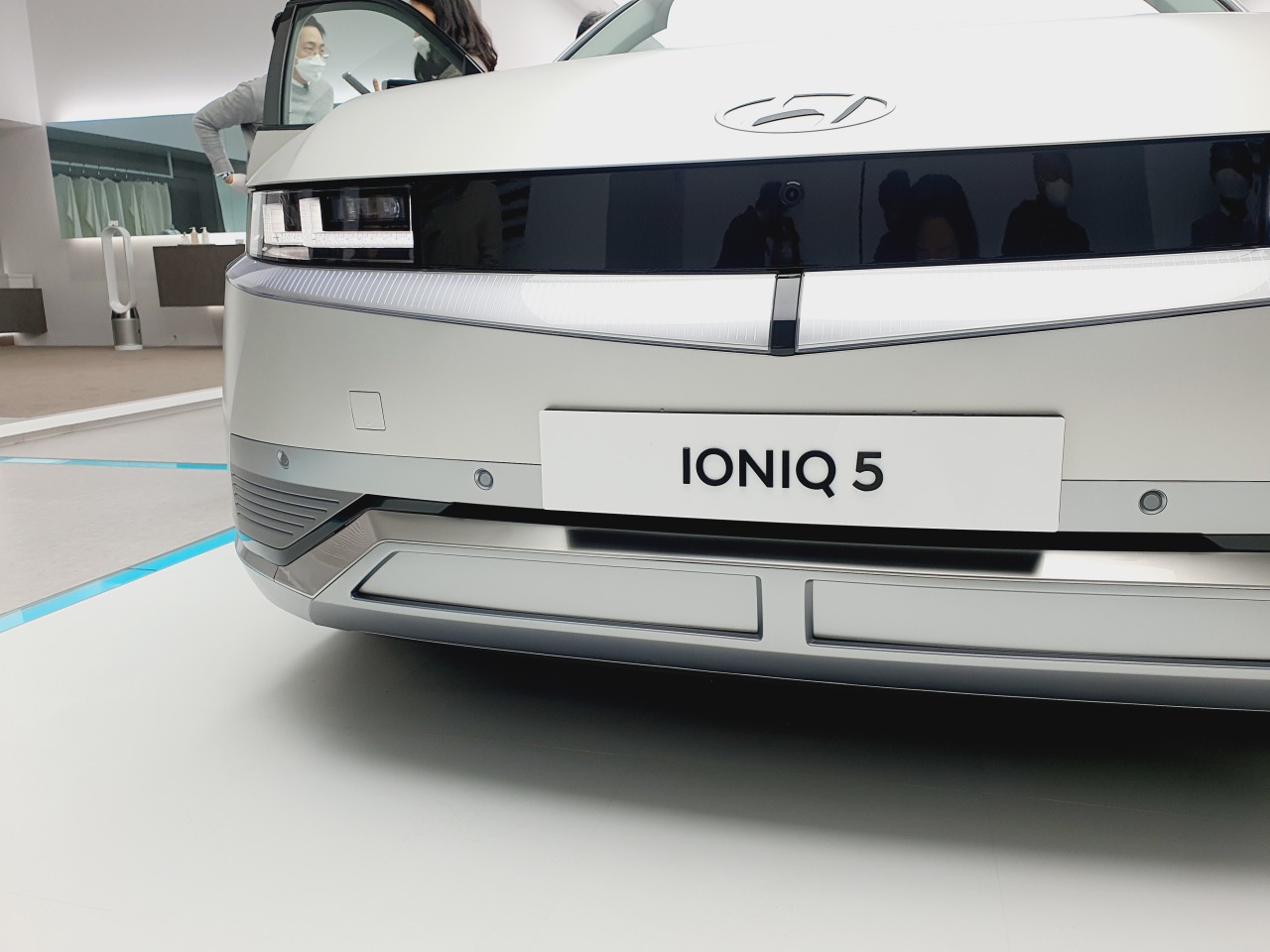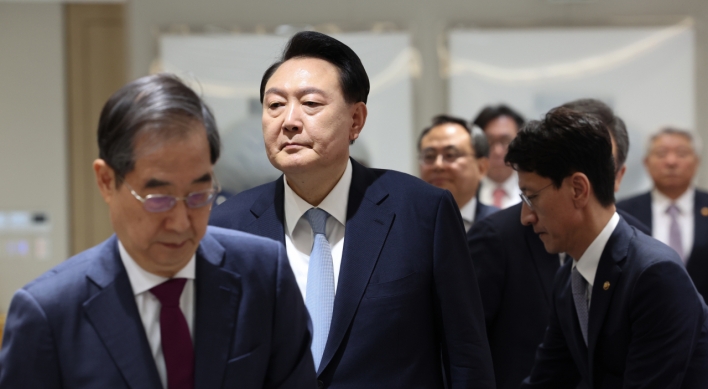Hyundai Motor halts plant amid chip shortage
Automaker to suffer setbacks in Ioniq 5, Kona SUV production
By Bae HyunjungPublished : April 7, 2021 - 16:43

Weighed down by a prolonged global semiconductor shortage, South Korea’s leading carmaker Hyundai Motor is temporarily halting some of its key production lines this month.
The suspension raised the alarm not only for the auto company but also for its subcontractors and local staffers.
Hyundai Motor said Wednesday that it has suspended its No. 1 plant in Ulsan for a week until April 14, due to the lack of electric control units. The corresponding plant is where the automaker manufactures Ioniq 5, its new signature all-electric vehicle built on the company’s exclusive electric-global modular platform, or E-GMP.
With the suspension, the company expects it will lose 12,500 units in total -- 6,500 units of the Ioniq 5 model and 6,000 units of the subcompact SUV Kona.
Officials are also currently in talks with the labor union on a possible suspension of its Asan plant in South Chungcheong Province, where steady sellers such as the Sonata and Grandeur models are produced. Over the weekend, the company canceled the scheduled overtime work at the No. 3 plant in Ulsan.
Hyundai Motor’s sister brand Kia Corp. also suspended its weekend overtime work at the Hwaseong plant, citing the lack of hybrid power control units. The decision will affect the manufacturing volumes of the Sorento SUV, Niro EV, and the all-new K8 sedan next month.
Consulting firm AlixPartners estimated the global automotive industry to have suffered a decline of $60.6 billion in sales during the January-March period. Market research firm IHS Markit expected production losses of 1 million units during the period.
The automakers’ subcontractors are also starting to feel the strain.
According to a survey conducted by the Korea Automobile Manufacturers Association on 53 local auto parts makers, 48.1 percent of the respondents said that they are cutting down on production due to a chip shortage. Also, 72 percent predicted that the supply problem will likely last throughout the year.
Due to a high level of stability requirements, automotive semiconductors face restrictions when it comes to additional production.
“It will be as early as the end of the second quarter for the current shortage problem to die down,” said Roh Geun-chang, researcher at Hyundai Motor Securities, in a recent report.
Thomas Caulfield, CEO of the world’s third-largest foundry player GlobalFoundries, was less optimistic, saying that the shortage may last until next year or stretch even longer.
Pressed by the supply-demand imbalance, the Korean government has attempted negotiations with global semiconductor providers, including market champion Taiwan Semiconductor Manufacturing Company, but to no avail.
Some market observers also pointed out that Korea needs to enhance its production capacities in nonmemory semiconductors, which account for 70 percent of the global chip market.
“We should note that the US is moving towards building semiconductor production facilities on its own soil,” said Ahn Ki-hyun, director of the Korea Semiconductor Industry Association.
“(Korea) should make efforts to lower its import dependency by creating its own nonmemory semiconductor ecosystem here.”
By Bae Hyun-jung (tellme@heraldcorp.com)
The suspension raised the alarm not only for the auto company but also for its subcontractors and local staffers.
Hyundai Motor said Wednesday that it has suspended its No. 1 plant in Ulsan for a week until April 14, due to the lack of electric control units. The corresponding plant is where the automaker manufactures Ioniq 5, its new signature all-electric vehicle built on the company’s exclusive electric-global modular platform, or E-GMP.
With the suspension, the company expects it will lose 12,500 units in total -- 6,500 units of the Ioniq 5 model and 6,000 units of the subcompact SUV Kona.
Officials are also currently in talks with the labor union on a possible suspension of its Asan plant in South Chungcheong Province, where steady sellers such as the Sonata and Grandeur models are produced. Over the weekend, the company canceled the scheduled overtime work at the No. 3 plant in Ulsan.
Hyundai Motor’s sister brand Kia Corp. also suspended its weekend overtime work at the Hwaseong plant, citing the lack of hybrid power control units. The decision will affect the manufacturing volumes of the Sorento SUV, Niro EV, and the all-new K8 sedan next month.
Consulting firm AlixPartners estimated the global automotive industry to have suffered a decline of $60.6 billion in sales during the January-March period. Market research firm IHS Markit expected production losses of 1 million units during the period.
The automakers’ subcontractors are also starting to feel the strain.
According to a survey conducted by the Korea Automobile Manufacturers Association on 53 local auto parts makers, 48.1 percent of the respondents said that they are cutting down on production due to a chip shortage. Also, 72 percent predicted that the supply problem will likely last throughout the year.
Due to a high level of stability requirements, automotive semiconductors face restrictions when it comes to additional production.
“It will be as early as the end of the second quarter for the current shortage problem to die down,” said Roh Geun-chang, researcher at Hyundai Motor Securities, in a recent report.
Thomas Caulfield, CEO of the world’s third-largest foundry player GlobalFoundries, was less optimistic, saying that the shortage may last until next year or stretch even longer.
Pressed by the supply-demand imbalance, the Korean government has attempted negotiations with global semiconductor providers, including market champion Taiwan Semiconductor Manufacturing Company, but to no avail.
Some market observers also pointed out that Korea needs to enhance its production capacities in nonmemory semiconductors, which account for 70 percent of the global chip market.
“We should note that the US is moving towards building semiconductor production facilities on its own soil,” said Ahn Ki-hyun, director of the Korea Semiconductor Industry Association.
“(Korea) should make efforts to lower its import dependency by creating its own nonmemory semiconductor ecosystem here.”
By Bae Hyun-jung (tellme@heraldcorp.com)








![[KH Explains] How should Korea adjust its trade defenses against Chinese EVs?](http://res.heraldm.com/phpwas/restmb_idxmake.php?idx=644&simg=/content/image/2024/04/15/20240415050562_0.jpg&u=20240415144419)










![[Today’s K-pop] Stray Kids to return soon: report](http://res.heraldm.com/phpwas/restmb_idxmake.php?idx=642&simg=/content/image/2024/04/16/20240416050713_0.jpg&u=)